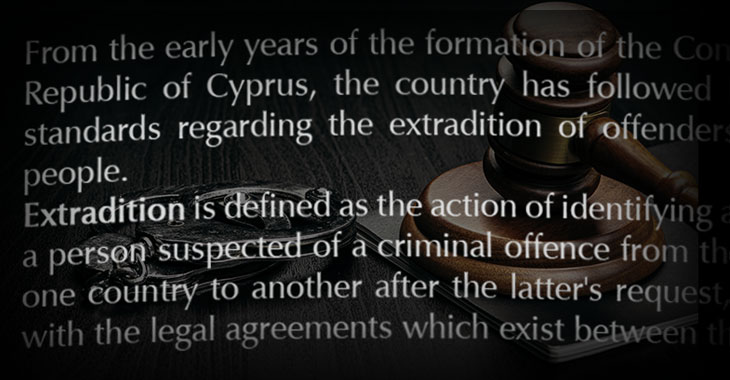
From the early years of the formation of the Constitution of the Republic of Cyprus, the country has followed European legal standards regarding the extradition of offenders or sentenced people. Extradition is defined as the action of identifying and transferring a person suspected of a criminal offence from the authorities of one country to another after the latter’s request, in accordance with the legal agreements which exist between them.
International Legal Agreements on Extradition
Cyprus has ratified a number of multilateral, as well as bilateral, agreements with countries in regards to the extradition of wanted persons and the transfer of sentenced persons.
Multilateral Agreements
- European Convention on Extradition (95/1990)
- Additional Protocol to the European Convention on Extradition (23/1979)
- Second Additional Protocol to the European Convention on Extradition (17/1984)
- European Convention on the Transfer of Sentenced Persons (14/1986)
- Additional Protocol on the Convention on Transfer of Sentenced Persons (12(III)/2001)
Bilateral Agreements
- Agreement on the Extradition of Offenders (13 of 1996) with Egypt
- Agreement on the Transfer of Sentenced Persons with Jordan (15 of 1996)
- Agreement on the Transfer of Sentenced Persons with Lebanon (16 of 1996)
- Treaty on the Extradition of Offenders (9 of 1997) with the USA
- Treaty on the Transfer of Persons Sentenced to Imprisonment (11 of 1997) with the Russian Federation
- Agreement on the Extradition of Offenders (15 of 2002) with Libya
- Agreement on the Transfer of Sentenced Persons (16 of 2002) with Libya

The Extradition Procedure in Cyprus
Initially, the main legal body for dealing with the extradition of offenders in Cyprus was the Law on Extradition of Fugitives 97/1970, as amended by Law 97/1990.
After the adoption of the European Convention on Extradition, the provisions of the two bodies merged.
- The Minister of Justice and Public Order receives all the extradition requests made by other countries, either directly or through diplomatic or police channels.
- Then, an oral hearing is carried out, where there is no need to prove a prima facie case, provided in Article 12 of the European Convention on Extradition. The person in question has the right to file for a habeas corpus or an appeal in case the court decides in favour of the extradition.
European Convention on Extradition
Cyprus signed the European Convention on Extradition in 1970, and it was enforced a year later. According to Article 1 of the Convention, all the Contracting Parties have the obligation to surrender to each other all persons “against whom the competent authorities of the requesting Party are proceeding for an offence or who are wanted by the said authorities for the carrying out of a sentence or detention order.” Extraditable offences are those which are punishable, under the law of both the requesting and the requested Party, by deprivation of liberty or detention for at least one year.
The Convention explicitly states that no extradition must occur in case of political offences, or when there are suspicions of the requested Party that the request for extradition is motivated by punishing the individual on the basis of their race, religion, nationality or political opinion – or that the person’s position may be prejudiced for any of these reasons – as stated in Article 3(1). The same prohibition applies for military offences which are not offences under the ordinary criminal law, according to Article 4.
No such extradition will be executed if there is “material reason to believe that the request to extradite or surrender was made with a view to criminally prosecute or punish the person on grounds of race, religion, nationality, ethnic origin, political belief or legitimate claims under international law to collective or personal rights.”
The European Convention on Extradition gives the option to the Contracting Parties to refuse a request for extraditing their own nationals in Article 6(1), or in case the offence has been committed, in whole or in part, in the territories of the requested Party – Article 7. The necessary documents which must be included in the request are laid down in Article 12, and include the original or an authenticated copy of the conviction and sentence, or the detention order, or the warrant of arrest, or another order to that effect; a statement of the offences for which the extradition is requested, with the time and place of their commission; a copy of the relevant enactments, or a statement of the relevant law (where possible); and an accurate description of the person in question.
The option to refuse a request for extraditing their own nationals
In addition, it provides for a provisional arrest in cases of emergency, under Article 16. The requesting Party can request the provisional arrest of a person, and the requested Party will decide this matter in accordance with its national law. Furthermore, the provisional arrest can be terminated if the requested Party has not received the request for extradition and relevant documents within 18 days of the arrest, or overall 40 days from the day of the arrest. According to Article 22, the extradition procedures are solely governed by the national law of the requested Party unless otherwise specified in this Convention.
Simplified Extradition Proceedings
In conjunction with the European Convention on Extradition, the European Council adopted the Convention relating to the Simplified Extradition Proceedings in March 1995, as ratified by L.12(III)/2004. Its aim was to facilitate the application of the European Convention and supplement its provisions.
Michael Chambers and Co. LLC Law Team are highly qualified lawyers in Extradition cases and will act rapidly in such cases to gather acquired information and act on your behalf. Contact us for details.
According to the Simplified Convention, Member States are obliged to surrender persons sought for the purpose of extradition under simplified procedures on two conditions:
- the person in question consents to be extradited, and
- the requested State gives its agreement.
Thus, the required documents which must be included in the extradition request have been limited to include:
- The identity of the person sought;
- The authority requesting the arrest;
- The existence of an arrest warrant or other document having the same legal effect or of an enforceable judgment;
- The nature and legal description of the offence;
- A description of the circumstances in which the offence was committed;
- The consequences of the offence in so far as this is possible.
The New Amendment to the Cyprus Constitution
Cyprus has recently amended its Constitution to allow the extradition of its own citizens to another European country, or to a third country, on the basis of a European arrest warrant or a bilateral or multilateral treaty that the Republic has signed. Article 11 of the Cyprus Constitution upholds the right to liberty and security of person. However, subsequent paragraphs of the article allow a person’s right to liberty to be circumvented in specific cases.

One of those cases include the arrest or detention of a national of the Republic with the purpose of extradition or surrender under the authority of a European arrest warrant or in accordance with an international treaty binding in the Republic. Once again, the law states that no such extradition will be executed if there is “material reason to believe that the request to extradite or surrender was made with a view to criminally prosecute or punish the person on grounds of race, religion, nationality, ethnic origin, political belief or legitimate claims under international law to collective or personal rights.”
It is worth noting that no statute of limitation exists under Cyprus law for the prosecution of criminal offences or the execution of sentences. Evidently, the country provides limited protection for its own nationals against extradition requests from other Contracting Parties. Although there is the option to refuse the extradition of its citizens, Cyprus loosened the restrictions with the introduction of the exceptions in extradition in Article 11 of its Constitution.
Extradition Cases in Cyprus
Earlier this year, 20-year-old Joshua Epiphaniou became the first Cypriot national who was extradited after the amendment of the Constitution. The young man was transferred to the United States in July 2020, where he is facing charges of conspiracy to commit wire transfer, wire fraud, conspiracy to commit computer fraud, identity theft and extortion, in the states of Georgia and Arizona. Joshua is reported to suffer from Asperger’s Syndrome and was a minor at the time of allegedly committing the crimes of cyber intrusion and extortion, in 2014-2016. The youngster was arrested in Cyprus in 2017 for offences of similar nature, and shortly after his release, he was arrested again for the extradition request sent from the US government. He had spent three years in custody without trial, until he finally “gave up and allowed himself” to be extradited.
Despite the option of each Contracting Party to refuse the extradition of their nationals, as stated in the Extradition Treaty between the United States and Cyprus, the country officials chose to surrender this young man to the United States to undergo trial for the alleged offences. Joshua’s defence lawyers argued that the extradition is a violation of his human rights, and the acceptance of the request to extradite was motivated by meeting the interests of the country’s ally.
Following Joshua’s extradition example, the authorities also transferred a 37-year-old Lebanese national, Ghassan Diab, from Cyprus to Florida, United States, the same month. Diab is accused of laundering drug proceeds through the black-market peso exchange in support of Hezbollah’s global criminal support network. He was provisionally arrested on March 9, 2019, for the purpose of extradition, at Larnaca International Airport upon his arrival from Beirut, Lebanon.
Extradition procedures often raise a variety of considerable human rights issues such as a fair trial, or prison conditions, and so on.
Summarizing
Cyprus laws have been in line with the provisions of the European Union and Commonwealth legal standards in regard to extraditing wanted people. It seems that the country is developing a more robust approach in the treatment of its national citizens, with the recent amendment of its Constitution. Nevertheless, the option to refuse extradition of Cypriot citizens still remains embedded in the European Convention on Extradition and most of the other bilateral legal agreements the Republic has signed.
If you wish to speak to one of our lawyers about extradition cases (International Cases or EU), in absolute confidence, feel free to contact us at info@chambers.law



